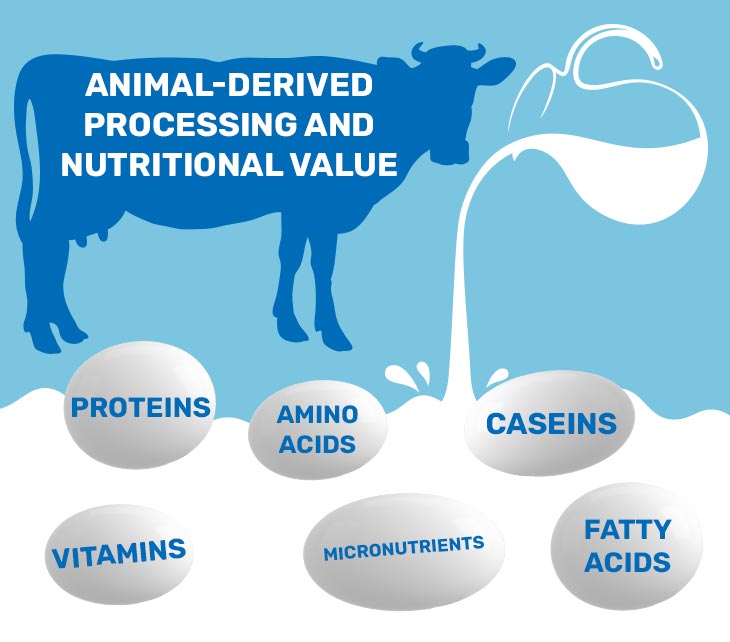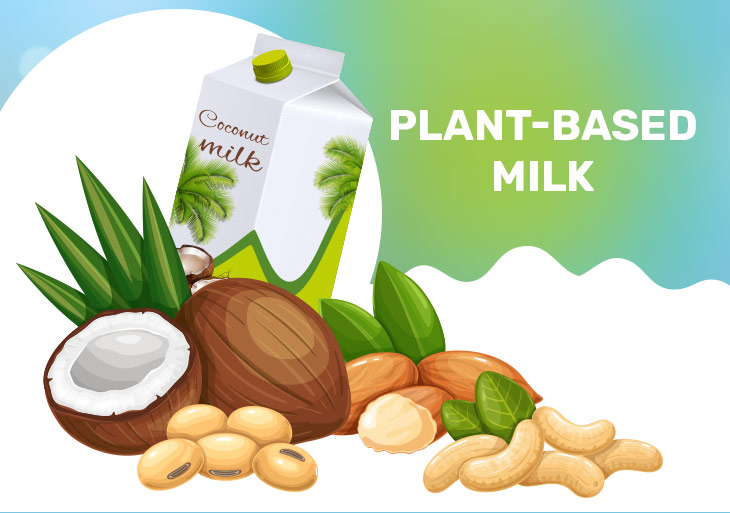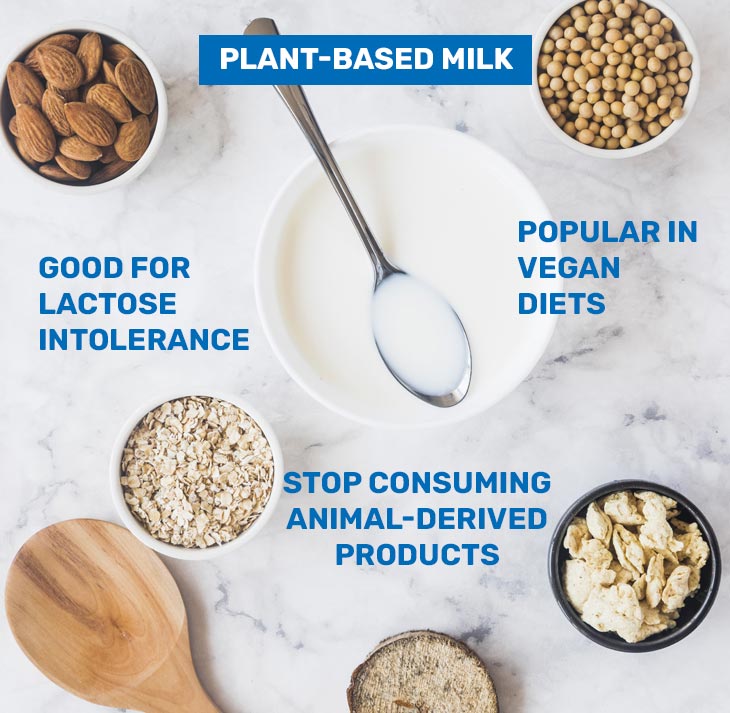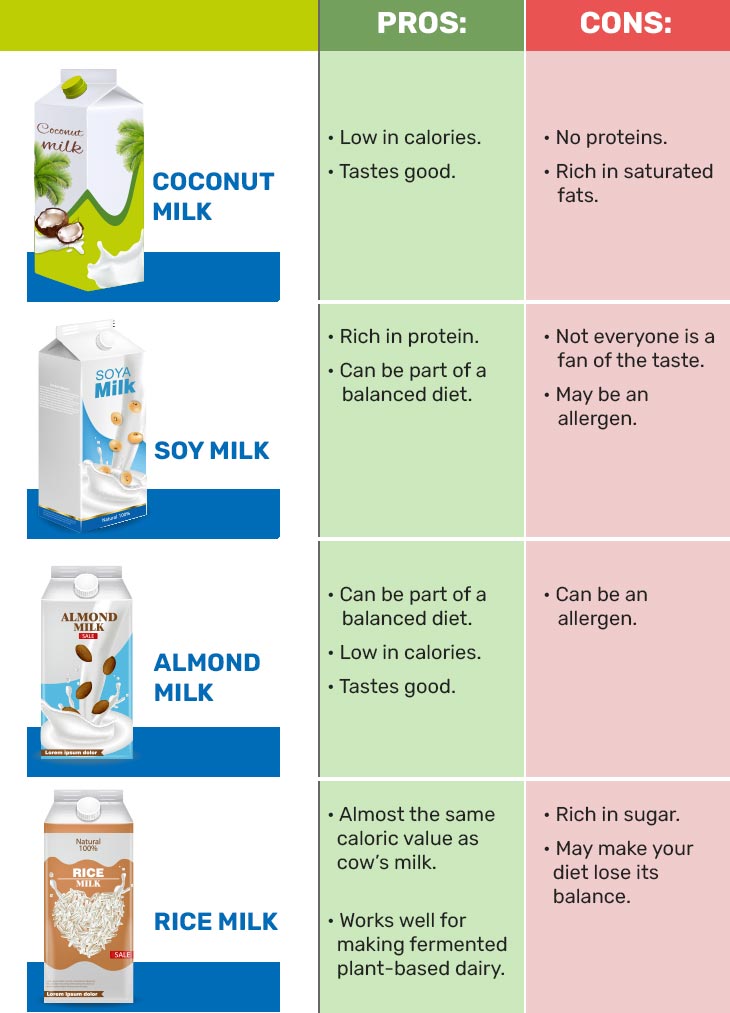Humanity is used to the idea of consuming animal-derived milk and dairy. We’ve been enjoying it since 8,000-10,000 BC. It’s been a cornerstone of our diets for ages. We value dairy for all the health benefits it brings, from filling us with energy to helping us build strong bones, develop muscles, improve our gut health and more. Milk boosts our immune system and works as an anti-inflammatory remedy and a probiotic.
Milk is still a very important part of the diet of people around the world—especially in poorer countries since it is a valuable source of calories and can help prevent issues in malnourished children. Many of us also just appreciate the taste of dairy products.
With that said, plant-based milk and dairy have become overwhelmingly popular lately. Today, cafes are expected to offer a range of plant-based milks for you to put in your coffee. And the amount of dairy products made of plant-based milk has increased significantly. In many places, it’s possible to find ice cream, fermented dairy, cheeses and other products made of plant-based milk.
In this article, we will try to figure out if plant-based milk can replace animal-derived milk in terms of health benefits.

Animal-derived milk—processing and nutritional value
The value of animal milk is hard to overestimate. It’s clearly beneficial and it’s considered to be important to consume for a good reason. This product is rich in proteins, amino acids, fatty acids and numerous vitamins and micronutrients. We’ve recently conducted extensive research on all the health benefits and nutritional value of animal-derived milk. You can check it out here.
But there is another side of milk. When unpasteurized, it can cause health issues due to the harmful microorganisms it might contain. That’s why it’s mandatory in most countries to pasteurize milk gathered for sale. Small farms must pasteurize their dairy too—even if they’re selling it to just a couple of people. However, many people who gather milk for their own use avoid this step (usually because they believe that pasteurization makes milk less beneficial for their health and worsens its taste).
Here are our thoughts on whether pasteurized milk is better or worse than raw milk:
While that might be true, it largely depends on the method of pasteurization. The best one is Ultra-High Temperature (UHT) pasteurization. It requires heating milk to 135-150°C for just a few seconds. This method allows you to preserve as many nutrients and vitamins as possible and doesn’t change the milk’s taste.
It’s easy to pasteurize milk at home with a pasteurizer. You can also use this machine to make fermented dairy products! Check out our range of pasteurizers if you want to get one for your kitchen. And if you have any issues with choosing the most suitable one, you can always reach out to us.
https://milkyday.com/products/milk-pasteurizers
Why do people switch to plant-based milk?

As we learn more about all the benefits of animal-derived milk, a few questions arise: Why has plant-based milk become so popular? Why do people choose it instead of animal-derived milk? The simple answer is that plant-based milk can also bring many health benefits.
But there are other reasons why people switch to such milk. First of all, they might want to stop consuming animal-derived products altogether and go vegan for their own reasons. Secondly, some might simply like the taste of plant-based milk better.
Another reason would be lactose intolerance. People who are allergic to lactose (sugar that is found in milk) experience many unpleasant symptoms when consuming animal-derived dairy. That’s why they turn to plant-based alternatives. However, there are so many options for lactose-free animal-derived dairy that you don’t necessarily have to give up the taste and texture of traditional dairy.

Lastly, with vegetarian and vegan diets becoming so popular, plant-based milk has become trendy as well. As a result, some people switch to these drinks with the sole goal of following something that is considered to be in vogue.
Benefits of plant-based milk
Plant-based milk can be divided into five types:
- Cereal-based
- Legume-based
- Nut-based
- Seed-based
- Pseudocereal-based
Obviously, the health benefits of each type of plant-based milk come from the products each milk alternative is made of. For legumes, the benefits are that they’re rich in carbs, proteins, fiber, vitamins and minerals. Chickpeas are full of fibers, monosaccharides, disaccharides and oligosaccharides. Soy contains a lot of carbs, proteins, lipids, fatty acids and amino acids.

Seeds contain animal-like proteins (when heated, enzymatically treated or presented with acids, they behave like those found in animal-derived milk). Pumpkin seeds have a lot of lipids, protein and carbs. Flaxseed is rich in fatty acids. Often, seed-based milk is made of sesame seeds, but it’s not a very advantageous animal milk alternative, as sesame seeds lose quite a lot of health benefits when processed to become plant-based milk. When fermented with lactic acid β-glucosidase, though, sesame milk gains quite a strong antioxidant effect. That’s why it’s best to use this drink for making fermented dairy alternatives.
Cereal milk is quite popular too. Oats are high in fiber, vitamin E, β-glucan and polyunsaturated fatty acids. They also work well as a probiotic. Moreover, they contain flavonoids, carotenoids, phenolic acids and other bioactive phytochemicals. Rice is low in protein but high in nutrients. When fermented, it contains a lot of calcium, iron and magnesium, and works as a probiotic.
Nut milk is perhaps the most popular option. Almonds contain a lot of monounsaturated fatty acids, protein, fiber, manganese, vitamin E, antioxidants and more, which makes this milk alternative the healthiest plant-based milk. It’s also considered to be the best-tasting plant-based milk. Coconut milk can increase high-density lipoprotein, thus contributing to lowering cholesterol levels. It’s also a great alternative to animal-derived milk when it comes to making dairy products or cooking dishes that should contain dairy.
Let’s highlight some important facts about plant-based milk and animal-derived milk (we’re using cow’s milk as an example of animal milk):

Coconut milk
Pros:
- Low in calories.
- Tastes good.
Cons:
- No proteins.
- Rich in saturated fats.
Soy milk
Pros:
- Rich in protein.
- Can be part of a balanced diet.
Cons:
- Not everyone is a fan of the taste.
- May be an allergen.
Almond milk
Pros:
- Can be part of a balanced diet.
- Low in calories.
- Tastes good.
Cons:
- Can be an allergen.
Rice milk
Pros:
- Almost the same caloric value as cow’s milk.
- Works well for making fermented plant-based dairy.
Cons:
- Rich in sugar.
- May make your diet lose its balance.
Plant-based milk concerns
The main concern is that industrial plant-based milks often contain quite a few undesirable ingredients such as preservatives, thickeners and sweeteners. They might cause issues for your digestive system. Pesticides and other things plants are often presented with might become a health hazard as plant-based milk is made. All that dangerous stuff will appear in your milk alternative. The best approach, in our opinion, is to make plant-based milk at home from ingredients that were checked for any harmful elements.
Also, remember that vegan milk is low in proteins, calcium and vitamin D. So if you decide to replace animal-derived milk with it, make sure to get enough of those micro and macronutrients from other foods or supplements.
The best plant-based milk for coffee
Now, let’s talk about the fun part: the taste. While everyone has their own favorite when it comes to flavor, plant-based milk hits differently when mixed with coffee in terms of both taste and texture. Also, different vegan milks behave differently when heated and introduced to the acidity of coffee.
Soy milk
Its taste is quite neutral, which is a good thing when it comes to adding it to your cup of coffee. It offers similar performance to animal-derived milk when heated. But it might curdle when presented with the acidity or the temperature of the coffee.
Almond milk
Its nutty and bitter taste can be a good addition to coffee. Almond milk adds a nice extra flavor, but due to the lower protein content, it’s quite watery. It can also split when added to coffee.
Coconut milk
This milk alternative is the best one in terms of texture. It’s creamy and dense, so it makes a good base for froth and foam. However, it’s quite sweet. That’s why those who love the acidic and bitter taste of coffee might not like adding coconut milk to their drink. Also, the bubbly foam of coconut milk fades quicker than that of animal-derived milk.
Oat milk
Taste-wise, this is the best partner for coffee thanks to its wheaty notes. It’s also rather thick and creamy, so it makes a good foam and stretches well. Unfortunately, it might curdle when combined with coffee.
Cashew milk
This milk alternative is quite expensive because of the priciness of cashew nuts. However, it is very similar to cow’s milk when it comes to creaminess. The nutty flavor complements the coffee quite deliciously, but it’s rather sweet, so if you love a bitter cup of coffee, cashew milk is not for you. The foam it creates is very bubbly and fades quickly while also having a “bubble bath” texture that many might find unpleasant.
Rice milk
It has a neutral taste that is good for not spoiling your favorite coffee. But rice milk is also quite watery, so if you’re craving an Americano with milk, add this alternative to espresso. This plant-based milk also performs poorly if you want to make some foam with it.
Final thoughts
Everyone should decide for themselves whether they want to stick to animal-derived milk or switch to vegan alternatives. It all comes down to your preferences in terms of diet and flavor. Plant-based milk can offer quite a lot of health benefits, but it all depends on the way a producer processes all those legumes, nuts, seeds or cereal.
As adamant lovers of homemade products, we want to encourage you to make your own plant-based milk at home—especially since it’s rather easy to make!
No comments:
Post a Comment